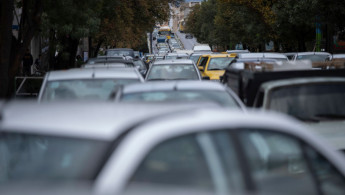Israel's new war on Gaza sets off currency devaluation crisis in Iran
Iran's ailing economy experienced further trouble due to the outbreak of a new war on the besieged Gaza Strip.
After three months of relative stability, the Iranian rial devaluated again, while prices of gold coins soared in the country after Hamas' large-scale operation against Israel dubbed 'Operation Al-Aqsa Flood'.
A few days before the war broke out on 7 October, one US dollar was sold for about 495,000 Iranian rials. Immediately after the news of Hamas' surprise attack was globally released, the devaluation of the Iranian currency began. On Monday, one greenback on the unofficial market was equal to about 535,000 rials.
The latest wave of currency devaluation came after three months of attempts by the establishment to keep the value of one US dollar below 500,000 Iranian rials by pumping hundreds of millions of dollars into the country's economy.
Before the weekend, currency market dealers had anticipated an increase in the value of the Iranian rial against the US dollar due to the release of Iran's US$6 billion frozen assets in South Korea and US$1.6 billion in Luxembourg.
However, the market predictions did not come true, and the devastating impact of the war in Gaza was immediate on Iran's economy, which has suffered from international sanctions, corruption, and mismanagement in the past two decades.
On Saturday, the Faris finance website Eghtessad 24 wrote that the lack of security in the market due to the war in Gaza caused the latest rial devaluation.
"The mental impact of the war in Palestine was like pouring petrol on the fire of the currency market."
Eghtessad 24 also predicted that the national currency's devaluation would continue until the deadly conflict ended in Gaza.
On Monday, the economic daily Donya-e Eqtesad also reported that the Tehran Stock Exchange (TSE) fell 2.5 percentage points in one day, experiencing one of its most significant falls in the past months.
Under the headline "The war's shrapnel hit the market," the daily wrote: "The recent declines in the markets occurred due to business owner's response to the uncertainty about the future of trade in the market."
Meanwhile, the establishment, which had rejected connections with Hamas' attack on Israel, organised the "Victory Celebration" in various cities, as the Fars news agency reported, affiliated with the Islamic Revolutionary Guard Corps.
The officials in Iran, one of the leading supporters of Hamas, have used the occasion to amplify the anti-Israel rhetoric.
Ali Akbar Velayati, a high-ranking aide to Iran's supreme leader, took the occasion to condemn countries in the Middle East that had begun the process of political normalisation with Israel.
"Those who think they can solve their problems by normalising relations with the Zionists should learn the lesson from the current incidents," he said.
"The resistance in Palestine has proved that the safe home Western colonialism had built for the Zionists was weaker than even the house of the spider," he added.





 Follow the Middle East's top stories in English at The New Arab on Google News
Follow the Middle East's top stories in English at The New Arab on Google News


